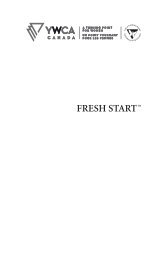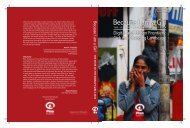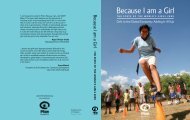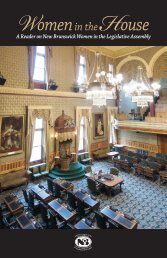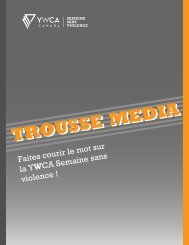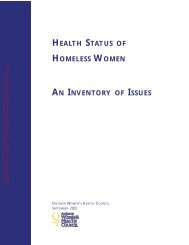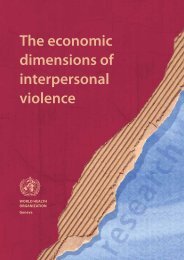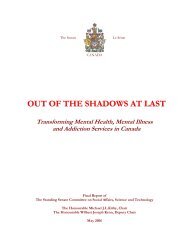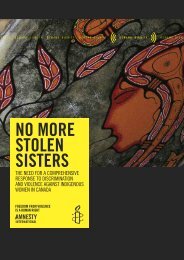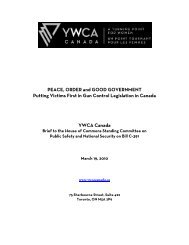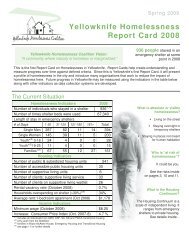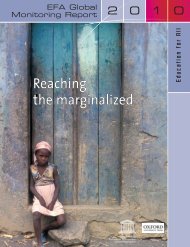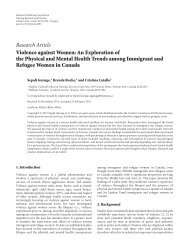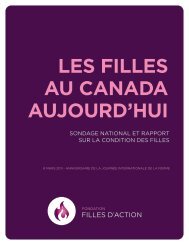Gender Report Card on the International Criminal ... - YWCA Canada
Gender Report Card on the International Criminal ... - YWCA Canada
Gender Report Card on the International Criminal ... - YWCA Canada
You also want an ePaper? Increase the reach of your titles
YUMPU automatically turns print PDFs into web optimized ePapers that Google loves.
Trial Proceedings<br />
The role of in-pers<strong>on</strong> witness testim<strong>on</strong>y<br />
in ICC proceedings<br />
256<br />
At <strong>the</strong> ICC, both <strong>the</strong> Prosecuti<strong>on</strong> and <strong>the</strong> Defence<br />
have <strong>the</strong> right to call in-pers<strong>on</strong> witnesses and to<br />
cross examine witnesses called by <strong>the</strong> o<strong>the</strong>r party. 1536<br />
The Prosecuti<strong>on</strong> and Defence determine how many<br />
and which witnesses to call to testify to support<br />
<strong>the</strong> charges or <strong>the</strong> defence case. Since <strong>the</strong> first<br />
c<strong>on</strong>firmati<strong>on</strong> of charges hearing was held in <strong>the</strong><br />
Lubanga case, <strong>the</strong> trend has been towards shorter<br />
hearings with fewer in-pers<strong>on</strong> witness testim<strong>on</strong>y,<br />
particularly by <strong>the</strong> Prosecuti<strong>on</strong>. 1537 The practice of<br />
<strong>the</strong> Prosecuti<strong>on</strong> with respect to calling witnesses is<br />
c<strong>on</strong>tinuing to emerge. The Prosecutor has stated<br />
that in his view an ideal scenario for <strong>the</strong> Prosecuti<strong>on</strong><br />
1536 Rule 140(2) provides: ‘In all cases, subject to article 64,<br />
paragraphs 8 (b) and 9, article 69, paragraph 4, and rule 88,<br />
sub-rule 5, a witness may be questi<strong>on</strong>ed as follows: (a) A party<br />
that submits evidence in accordance with article 69, paragraph<br />
3, by way of a witness, has <strong>the</strong> right to questi<strong>on</strong> that witness;<br />
(b) The prosecuti<strong>on</strong> and <strong>the</strong> defence have <strong>the</strong> right to questi<strong>on</strong><br />
that witness about relevant matters related to <strong>the</strong> witness’s<br />
testim<strong>on</strong>y and its reliability, <strong>the</strong> credibility of <strong>the</strong> witness and<br />
o<strong>the</strong>r relevant matters; (c) The Trial Chamber has <strong>the</strong> right to<br />
questi<strong>on</strong> a witness before or after a witness is questi<strong>on</strong>ed by a<br />
participant referred to in sub-rules 2 (a) or (b); (d) The defence<br />
shall have <strong>the</strong> right to be <strong>the</strong> last to examine a witness.’ In<br />
additi<strong>on</strong>, Article 67 sets forth <strong>the</strong> specific rights of <strong>the</strong> accused<br />
with regard to <strong>the</strong> questi<strong>on</strong>ing of witnesses. Pursuant to<br />
Article 67(1)(e), <strong>the</strong> accused has <strong>the</strong> right ‘to examine, or have<br />
examined, <strong>the</strong> witnesses against him or her and to obtain <strong>the</strong><br />
attendance and examinati<strong>on</strong> of witnesses <strong>on</strong> his or her behalf<br />
under <strong>the</strong> same c<strong>on</strong>diti<strong>on</strong>s as witnesses against him or her. The<br />
accused shall also be entitled to raise defences and to present<br />
o<strong>the</strong>r evidence admissible under this Statute.’<br />
1537 The c<strong>on</strong>firmati<strong>on</strong> hearings in <strong>the</strong> Lubanga and Katanga &<br />
Ngudjolo cases lasted approximately three weeks (8 – 29<br />
November 2006 and 27 June – 18 July 2008, respectively).<br />
The Bemba c<strong>on</strong>firmati<strong>on</strong> hearing took place over <strong>the</strong> time<br />
span of <strong>on</strong>ly five days (12 – 15 January 2009). The Abu Garda<br />
c<strong>on</strong>firmati<strong>on</strong> hearing lasted approximately 10 days (19 – 29<br />
October 2009) and <strong>the</strong> c<strong>on</strong>firmati<strong>on</strong> hearing in Banda & Jerbo<br />
took <strong>on</strong>ly <strong>on</strong>e day (8 December 2010). The Mbarushimana<br />
c<strong>on</strong>firmati<strong>on</strong> hearing lasted three days (16, 19 – 20 September<br />
2011). The c<strong>on</strong>firmati<strong>on</strong> hearing in <strong>the</strong> first case in <strong>the</strong> Kenya<br />
Situati<strong>on</strong>, against Ruto, Kosgey and Sang, took place during<br />
six days (1 – 8 September 2011). In c<strong>on</strong>trast, <strong>the</strong> c<strong>on</strong>firmati<strong>on</strong><br />
hearing in <strong>the</strong> case against Muthaura, Kenyatta and Ali took<br />
approximately three weeks (12 September – 4 October 2011).<br />
would be to present cases without witnesses,<br />
without victims: ‘Our goal is a case with no<br />
witnesses, no victims. We want to use methods<br />
... such as statistical analysis’. 1538 N<strong>on</strong>e<strong>the</strong>less, as<br />
of 16 September 2011, <strong>the</strong> ICC has heard from<br />
approximately 144 witnesses in 3 trials. 1539 While<br />
<strong>on</strong>ly two of <strong>the</strong>se three trials included charges<br />
of gender-based crimes, and <strong>on</strong>ly 14 crimebased<br />
witnesses, or 0.1% of <strong>the</strong> total number<br />
of witnesses, have been called specifically to<br />
substantiate charges of gender-based crimes, 1540<br />
witnesses have testified about gender-based<br />
crimes in all three trials.<br />
1538 ‘Hague C<strong>on</strong>ference: Social Science Research Seen to Play<br />
Key Role in Building Instituti<strong>on</strong>s of Internati<strong>on</strong>al <strong>Criminal</strong><br />
Law: Innovati<strong>on</strong>s in evidence ga<strong>the</strong>ring can help hold<br />
leaders accountable for sexual violence and genocide’,<br />
Centre <strong>on</strong> Law & Globalizati<strong>on</strong> Press Release, p 2-3,<br />
available at , last visited <strong>on</strong> 31 October 2011.<br />
1539 This figure includes all witnesses called by all parties,<br />
including expert witnesses, witnesses called by <strong>the</strong> Legal<br />
Representatives of Victims and witnesses called by <strong>the</strong><br />
Chamber. The figure is based <strong>on</strong> <strong>the</strong> public record of<br />
<strong>the</strong> three cases currently at trial (Lubanga, Katanga &<br />
Ngudjolo and Bemba). Since <strong>the</strong> start of <strong>the</strong> Lubanga case<br />
in January 2009 until 16 September 2011, <strong>the</strong> Prosecuti<strong>on</strong><br />
called a total of 89 witnesses in <strong>the</strong> three trials, including<br />
eight expert witnesses; <strong>the</strong> Defence called a total of 44<br />
witnesses; five participating victims were authorised to<br />
testify; and <strong>the</strong> Chamber called six expert witnesses. For<br />
a more detailed overview of <strong>the</strong> number of witnesses<br />
called in each trial, see <strong>the</strong> Trial Proceedings secti<strong>on</strong> of <strong>the</strong><br />
<str<strong>on</strong>g>Gender</str<strong>on</strong>g> <str<strong>on</strong>g>Report</str<strong>on</strong>g> <str<strong>on</strong>g>Card</str<strong>on</strong>g> 2009, 2010 and 2011.<br />
1540 The Prosecuti<strong>on</strong> called a total of 14 n<strong>on</strong>-expert witnesses<br />
to substantiate charges of sexual and gender-based<br />
violence (SGBV) in <strong>the</strong> two trials in which <strong>the</strong> accused<br />
have been charged with gender-based crimes (Katanga<br />
& Ngudjolo and Bemba). In Katanga & Ngudjolo, <strong>the</strong><br />
Prosecuti<strong>on</strong> called two (female) witnesses to testify<br />
directly <strong>on</strong> sexual violence; in Bemba <strong>the</strong> Prosecuti<strong>on</strong><br />
called 12 n<strong>on</strong>-expert witnesses, nine of whom were<br />
female, to testify directly <strong>on</strong> sexual violence. For a more<br />
detailed overview of <strong>the</strong> witness testim<strong>on</strong>y <strong>on</strong> sexual<br />
violence in <strong>the</strong> Katanga & Ngudjolo case, see <str<strong>on</strong>g>Gender</str<strong>on</strong>g><br />
<str<strong>on</strong>g>Report</str<strong>on</strong>g> <str<strong>on</strong>g>Card</str<strong>on</strong>g> 2010, p 163-178; for a more detailed overview<br />
of <strong>the</strong> witness testim<strong>on</strong>y <strong>on</strong> sexual violence in <strong>the</strong> Bemba<br />
case, see <strong>the</strong> Trial Proceedings secti<strong>on</strong> of this <str<strong>on</strong>g>Report</str<strong>on</strong>g>,<br />
above.



